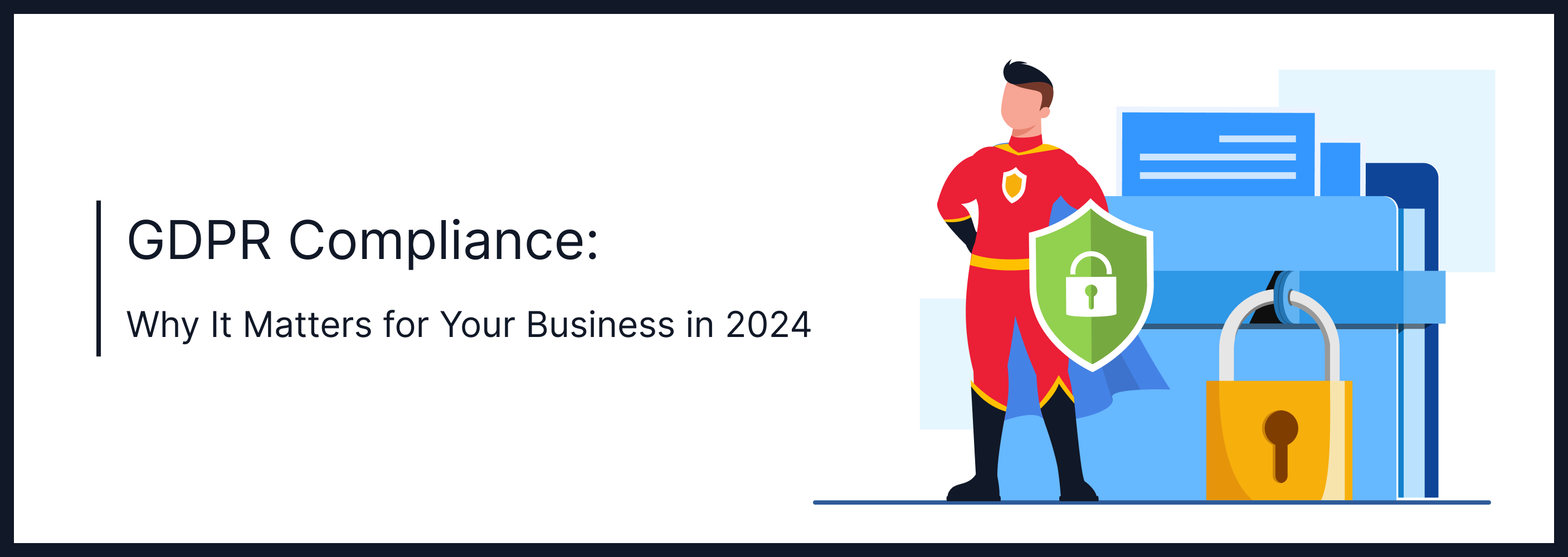
Oct 15, 2024 Information hub
GDPR Compliance: Why It Matters for Your Business in 2024
In today’s digital age, data is one of the most valuable assets for businesses. However, with the increasing reliance on data comes the responsibility to protect it. The General Data Protection Regulation (GDPR) is a legal framework that sets guidelines for the collection and processing of personal information from individuals who live in the European Union (EU). Since its enforcement in May 2018, GDPR compliance has become a critical concern for businesses worldwide, not just those based in the EU.
The significance of GDPR compliance cannot be overstated. Non-compliance can result in hefty fines, reputational damage, and loss of customer trust. In this blog post, we will explore the importance of GDPR compliance, its relevance in today’s business environment, practical examples, challenges, and future developments. Whether you’re a small business owner or part of a large corporation, understanding GDPR compliance is essential for safeguarding your business and maintaining customer trust.
What is GDPR Compliance?
Overview of GDPR
The General Data Protection Regulation (GDPR) is a comprehensive data protection law that was enacted by the European Union to protect the privacy and personal data of individuals within the EU. It applies to any organization that processes the personal data of EU citizens, regardless of where the organization is located. This means that even businesses outside the EU must comply with GDPR if they handle data from EU residents.
GDPR is designed to give individuals more control over their personal data and to ensure that businesses handle this data responsibly. It covers a wide range of data protection principles, including transparency, accountability, and the rights of individuals.
Key Principles of GDPR
GDPR is built on several key principles that businesses must adhere to:
- Lawfulness, Fairness, and Transparency: Data must be processed lawfully, fairly, and in a transparent manner.
- Purpose Limitation: Data should only be collected for specified, explicit, and legitimate purposes.
- Data Minimization: Only the data necessary for the intended purpose should be collected.
- Accuracy: Personal data must be accurate and kept up to date.
- Storage Limitation: Data should not be kept for longer than necessary.
- Integrity and Confidentiality: Data must be processed in a manner that ensures appropriate security.
- Accountability: Organizations must be able to demonstrate compliance with GDPR principles.
Why is GDPR Compliance Relevant Today?
The Growing Importance of Data Privacy
In recent years, data breaches and privacy scandals have become increasingly common. High-profile cases, such as the Facebook-Cambridge Analytica scandal, have highlighted the need for stronger data protection regulations. Consumers are more aware than ever of how their personal data is being used, and they expect businesses to take their privacy seriously.
GDPR compliance is not just about avoiding fines; it’s about building trust with your customers. According to a survey by Cisco, 84% of consumers care about data privacy, and 48% have switched companies due to their data policies. Businesses that prioritize GDPR compliance can differentiate themselves by demonstrating a commitment to protecting customer data.
Global Impact of GDPR
Although GDPR is an EU regulation, its impact is global. Many countries have adopted similar data protection laws, such as the California Consumer Privacy Act (CCPA) in the United States and the Personal Information Protection and Electronic Documents Act (PIPEDA) in Canada. As data privacy becomes a global concern, businesses that comply with GDPR are better positioned to navigate the evolving regulatory landscape.
Practical Examples of GDPR Compliance
Example 1: Google’s GDPR Fine
Example 2: British Airways Data Breach
Example 3: Small Business Compliance
Even small businesses are not exempt from GDPR compliance. For example, a small e-commerce business that sells products to EU customers must ensure that it collects only the necessary customer data, such as shipping addresses and payment information, and that this data is stored securely. The business must also provide customers with clear information about how their data will be used and give them the option to opt out of marketing communications.
Challenges of GDPR Compliance
1. Complexity of the Regulation
One of the biggest challenges businesses face when it comes to GDPR compliance is the complexity of the regulation. GDPR is a comprehensive law with many requirements, and understanding how it applies to your business can be difficult. For example, businesses must determine whether they are a data controller or a data processor, and they must implement appropriate technical and organizational measures to protect personal data.
2. Data Mapping and Inventory
To comply with GDPR, businesses must have a clear understanding of what personal data they collect, where it is stored, and how it is processed. This requires conducting a thorough data mapping and inventory process, which can be time-consuming and resource-intensive, especially for large organizations with complex data systems.
3. Consent Management
GDPR requires businesses to obtain explicit consent from individuals before collecting and processing their personal data. Managing consent can be challenging, particularly for businesses that rely on third-party data or use cookies to track user behavior. Businesses must ensure that they have a clear and easy-to-understand consent process in place and that they can demonstrate that consent has been obtained.
4. Data Subject Rights
Under GDPR, individuals have several rights, including the right to access their data, the right to have their data erased, and the right to object to data processing. Businesses must have processes in place to respond to these requests in a timely manner, which can be challenging, especially if the business handles large volumes of data.
Benefits of GDPR Compliance
1. Enhanced Customer Trust
One of the most significant benefits of GDPR compliance is the increased trust it can build with customers. When customers know that a business is committed to protecting their personal data, they are more likely to engage with that business and share their information. This can lead to stronger customer relationships and increased loyalty.
2. Reduced Risk of Data Breaches
GDPR requires businesses to implement appropriate security measures to protect personal data. By complying with these requirements, businesses can reduce the risk of data breaches and the associated financial and reputational damage. According to IBM’s 2021 Cost of a Data Breach Report, the average cost of a data breach is $4.24 million, making data security a critical concern for businesses.
3. Competitive Advantage
In a world where data privacy is becoming increasingly important, businesses that comply with GDPR can gain a competitive advantage. By demonstrating a commitment to data protection, businesses can differentiate themselves from competitors and attract privacy-conscious customers.
4. Better Data Management
GDPR compliance requires businesses to have a clear understanding of the data they collect and how it is used. This can lead to better data management practices, which can improve operational efficiency and reduce the risk of data-related issues.
Current Trends and Future Developments in GDPR Compliance
1. Increased Enforcement
Since GDPR came into effect, enforcement has been steadily increasing. Data protection authorities across the EU have been issuing fines for non-compliance, and this trend is expected to continue. Businesses should be prepared for increased scrutiny and ensure that they are fully compliant with GDPR requirements.
2. The Rise of Data Privacy Technologies
As businesses strive to comply with GDPR, there has been a growing demand for data privacy technologies. These technologies, such as data encryption, anonymization, and consent management platforms, can help businesses protect personal data and manage compliance more effectively.
3. The Impact of AI and Machine Learning
Artificial intelligence (AI) and machine learning are transforming the way businesses process data. However, these technologies also raise new challenges for GDPR compliance. For example, businesses must ensure that AI algorithms do not process personal data in ways that violate GDPR principles, such as fairness and transparency. As AI continues to evolve, businesses will need to stay up to date with the latest developments in data privacy regulations.
4. The Future of Data Privacy Regulations
GDPR has set the standard for data privacy regulations worldwide, and many countries are following suit by implementing their own data protection laws. As data privacy becomes a global concern, businesses will need to navigate an increasingly complex regulatory landscape. Staying compliant with GDPR will be essential for businesses that operate internationally.
Conclusion
GDPR compliance is not just a legal requirement; it’s a business imperative in today’s data-driven world. By complying with GDPR, businesses can protect customer data, build trust, and gain a competitive advantage. However, achieving compliance can be challenging, particularly given the complexity of the regulation and the evolving nature of data privacy.
To ensure GDPR compliance, businesses should:
- Conduct a thorough data mapping and inventory process.
- Implement appropriate security measures to protect personal data.
- Obtain explicit consent from individuals before collecting and processing their data.
- Respond to data subject requests in a timely manner.
- Stay up to date with the latest developments in data privacy regulations.
By taking these steps, businesses can not only avoid fines and legal issues but also build stronger relationships with their customers and position themselves for success in the digital age.
Actionable Takeaways:
- Audit your data: Conduct a thorough audit of the personal data you collect, store, and process.
- Review your consent processes: Ensure that you have clear and transparent consent mechanisms in place.
- Implement security measures: Protect personal data with encryption, anonymization, and other security technologies.
- Stay informed: Keep up to date with the latest developments in data privacy regulations and adjust your practices accordingly.
By prioritizing GDPR compliance, businesses can navigate the complexities of data privacy and build a foundation of trust with their customers.
